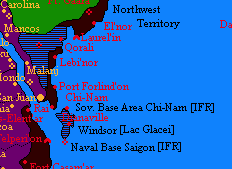Mala: Difference between revisions
No edit summary |
No edit summary |
||
| Line 43: | Line 43: | ||
== Etymology == | == Etymology == | ||
The name ''Mala'' comes from the Mala'anje language (Hawaiian) and means ''garden''; an archaic reference to the original settlement of Malanj that was said to have been founded in a field of flowers. | The name ''Mala'' comes from the Mala'anje language (Hawaiian) and means ''garden''; an archaic reference to the original settlement of Malanj that was said to have been founded in a field of flowers. The addition of ''nj'' or ''anje'' is a traditional word meaning village and villager respectively. Thus the literal translation of Malanj would be rendered as ''Garden Village''. | ||
== History == | == History == | ||
Mala began as an independent collection of tribal city-states, | Mala began as an independent collection of tribal city-states. Oral traditions dating back to around -1000 [[ASC]] relate that the warring city-states were in constant conflict until the coming of King Keoua. At the behest of Keoua the other tribal leaders gathered and agreed to form a loose confederation with Keoua himself as sovereign. Mala'anje traditions view the entirety of Mala as a great garden, with its people as its caretakers. Keoua led the tribal leaders to the site of Malanj, which was said to be along the western coast in an area of unsurpassed beauty, and founded the city there that would give birth to the Kingdom of Mala. | ||
Around -10 ASC Mala was overrun by one of Micras' earliest nations; [[Cyberia]]. Cyberia was technologically advanced and had colonialist ambitions for Mala and the surrounding area. It was then incorporated as a province in the southwest of the [[Federal Republic of Cyberia]]. It became a vibrant province with mixed Imperial, [[Mala'anje]] and Socialist influence. After the [[First War of Cyberian Liberation]], the province was renamed Felicia as a punishment of the Mala'anje who supported [[UPEC]] and the rebels. The Mala'anje were repressed during the early stages of Cyberian colonialism, and under [[Kahunamea IV]] many migrated to [[Cognito]] under invitation from the [[United Imperium|United Imperium's]] Emperor, [[Jacobus]]. These migrants would settle in the [[Tigra Isles]] and [[Melangia]], eventually becoming distinct cultures unto themselves. | |||
== Government and Politics == | == Government and Politics == | ||
Revision as of 15:41, 16 April 2021
| Mala First Nation | |||
| |||
| Motto: Mua a ke Ma'o | |||
| Anthem: | |||

| |||
| Map versions | |||
| Capital | Ko'aka | ||
| Largest city | Ko'aka | ||
| Official language(s) | Mala'anje | ||
| Official religion(s) | Tribalism | ||
| Demonym | Mala'anje | ||
| - Adjective | Malan | ||
| Government | Constitutional Monarchy | ||
| - Aliʻi nui | Kahunamea XI | ||
| - Prime Minister | David Loloku | ||
| - Legislature | House of Nobles | ||
| Establishment | -583 ASC | ||
| Area | |||
| Population | 3,002,581 (1695 AN) | ||
| Currency | Malan dollar (MLD) | ||
| Calendar | |||
| Time zone(s) | |||
| Mains electricity | |||
| Driving side | right | ||
| Track gauge | |||
| National website | N/A | ||
| National forum | N/A | ||
| National animal | Nene | ||
| National food | Kalo | ||
| National drink | Tea | ||
| National tree | Kukui | ||
| Abbreviation | MAL, MA | ||
Mala is a sovereign First Nation of indigenous Mala'anje people located on the southeastern shores of Keltia. Mala is considered to be the oldest nation in the world and its founding predates some of the earliest civilizations. The Mala'anje people are accepted as some of the first indigenous inhabitants of Micras, and their early explorations helped to spread humanity across the globe.
Etymology
The name Mala comes from the Mala'anje language (Hawaiian) and means garden; an archaic reference to the original settlement of Malanj that was said to have been founded in a field of flowers. The addition of nj or anje is a traditional word meaning village and villager respectively. Thus the literal translation of Malanj would be rendered as Garden Village.
History
Mala began as an independent collection of tribal city-states. Oral traditions dating back to around -1000 ASC relate that the warring city-states were in constant conflict until the coming of King Keoua. At the behest of Keoua the other tribal leaders gathered and agreed to form a loose confederation with Keoua himself as sovereign. Mala'anje traditions view the entirety of Mala as a great garden, with its people as its caretakers. Keoua led the tribal leaders to the site of Malanj, which was said to be along the western coast in an area of unsurpassed beauty, and founded the city there that would give birth to the Kingdom of Mala.
Around -10 ASC Mala was overrun by one of Micras' earliest nations; Cyberia. Cyberia was technologically advanced and had colonialist ambitions for Mala and the surrounding area. It was then incorporated as a province in the southwest of the Federal Republic of Cyberia. It became a vibrant province with mixed Imperial, Mala'anje and Socialist influence. After the First War of Cyberian Liberation, the province was renamed Felicia as a punishment of the Mala'anje who supported UPEC and the rebels. The Mala'anje were repressed during the early stages of Cyberian colonialism, and under Kahunamea IV many migrated to Cognito under invitation from the United Imperium's Emperor, Jacobus. These migrants would settle in the Tigra Isles and Melangia, eventually becoming distinct cultures unto themselves.


